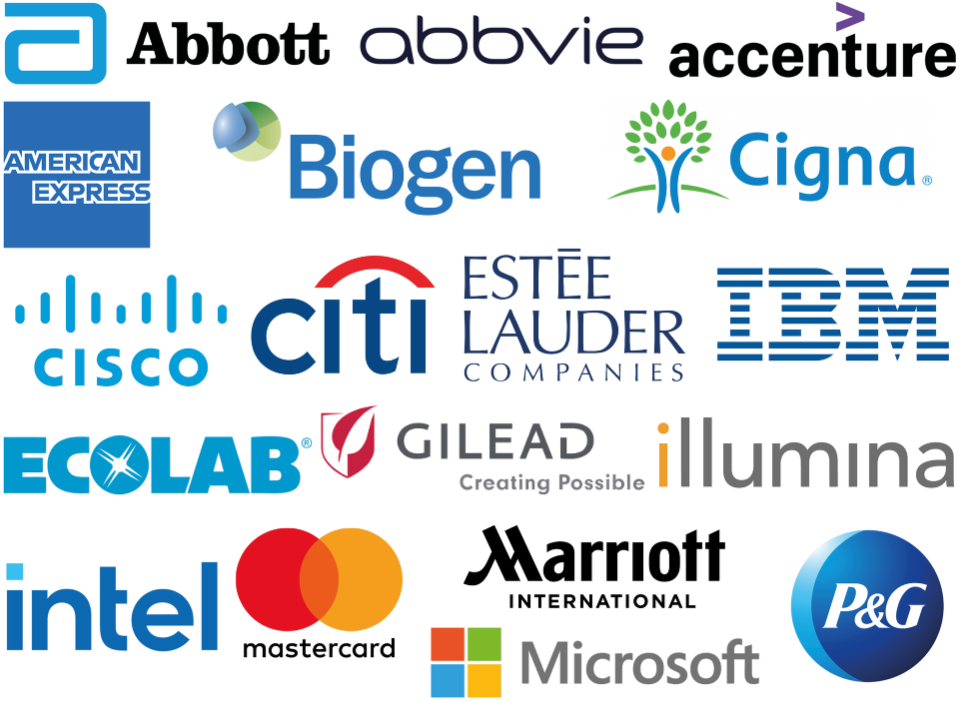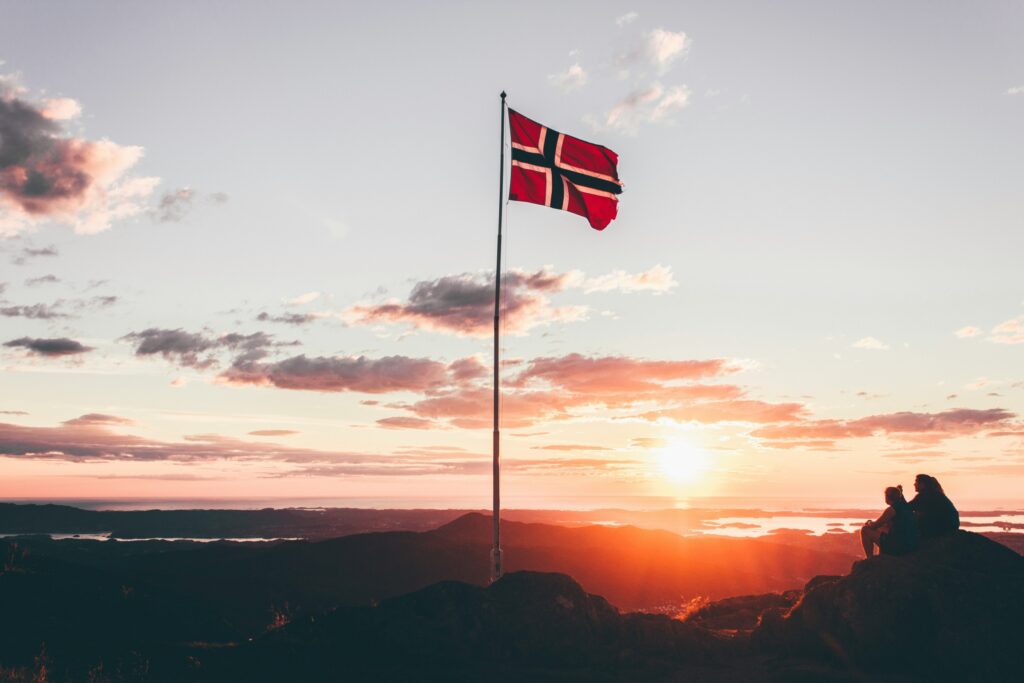November 04, 2022 UPDATE – JLens is pleased to announce the recipients of its 2022 CSR Awards; 18 companies that represent excellent performance on JLens’ six Jewish values pillars.
In 2016, JLens created the Jewish Advocacy Strategy US to invest in the 300 largest and most influential US public corporations in order to conduct investor advocacy on behalf of the Jewish community. The Jewish Advocacy Strategy US has grown to over $200 million, with investments from over 30 Jewish institutions including federations, foundations, and nonprofits. JLens has developed an in-house methodology to score and rank companies through a Jewish values lens. JLens’ scoring of companies is based on six core Jewish values pillars derived from Judaism’s framework of obligations (mitzvot). Through robust data collection, in-depth research, and direct engagement, JLens has identified 18 corporations that represent excellence and outperform sector peers on a wide array of environmental, social and governance issues through a Jewish lens.
Advocacy and Representation
JLens is the only Jewish voice influencing corporate values in the boardroom. The JLens team advocates on issues that matter most to the Jewish community through direct engagement, participating in investor letters with key partners, and when necessary, filing shareholder resolutions.
The overarching Jewish value guiding JLens’ approach to responsible investing is hocheach tocheach (‘constructive rebuke’ from Leviticus 19:17). As there is no perfect company, attempts to solely screen out ‘bad actors’ or only invest in ‘best actors’ miss the greatest opportunity to impact companies’ social responsibility development, and engage directly to influence corporate leadership.
CSR Award Recipients
These 18 corporations receiving the JLens CSR Award tie sustainability outcomes to corporate mission and direct investments in the circular economy; invest in communities and employees with strong commitments to equitable pay, diversity initiatives, and work-life balance; encourage responsible energy and resource use by managing climate risks with science-based targets (SBTs); all while managing supply chains to embrace and commit to the same principles. All of these companies operate in Israel or have significant relationships and direct investments in the Israeli economy, as well as strong programs that foster coexistence and religious inclusion across operations.
1. Abbott, Healthcare and Medical Devices
Abbott has a strong presence in Israel, operating an R&D center and an office that works on nutrition, pharmaceuticals, and diagnostics, with a focus on diabetes treatment. Abbott is committed to health equity globally; in African countries like Rwanda Abbott works to bridge the healthcare gap in rural populations, and provides training and support to African medical professionals. To create diversity within STEM fields, Abbott runs STEM programs and internships for 100,000 young people, half of those coming from underrepresented groups. During the Covid pandemic, Abbott developed various tests and diagnostic products, and is working alongside other companies and organizations to further global pandemic preparedness in the future.
2. Abbvie, Pharmaceuticals
Abbvie has played an important role during the Covid pandemic in ensuring access to medicine throughout the world. When one of the company’s drugs became a possible treatment for COVID, the company released all of its intellectual property rights so the drug could be produced easily and economically around the world. AbbVie also expanded its patient assistance program to ensure those who were uninsured could access necessary medications. AbbVie has demonstrated a strong commitment to diversity and inclusion, and has a Jewish Resource Committee to support Jewish employees. The company has a history of strong ties to Israel, with over 200 employees working on drug development, as well as research partnerships with various Israeli hospitals.
3. Accenture, Management Consulting, Technology and Outsourcing Services
Accenture reports to JLens that any client work must align with the company’s core values. By 2025, the company aims to achieve a 50/50 gender-balanced workforce, and Accenture is very close to achieving this goal. Accenture embodies best-in-class religious inclusion policies regarding flexible religious holiday accommodations, “dress for your day” inclusive clothing policies, and an active interfaith employee resource group. The company is a leader in reducing net carbon emissions, including encouraging 75% of its suppliers to take action to reduce emissions, and aiming to use only renewable energy across its operations by 2023. Accenture is deeply invested in the Israeli economy with an R&D lab in Herzliya as well as Accenture technology competitions across universities, among other technology investments in Israel.
4. American Express, Financial Services
American Express has played a leadership role in decreasing economic inequities during the Covid pandemic by implementing financial relief programs and waiving fees and interest for individuals and small businesses in need. The company has taken a strong stance against BDS, pulling its sponsorship from the Roger Waters tour in light of his anti-Israel remarks and continuing to retain a strong relationship with Israel. American Express has demonstrated a commitment to diversity and inclusion, implementing a gender/racial pay equity analysis and achieving gender pay equity throughout its global workforce. American Express is also committed to supplier diversity, unconscious bias training, and inclusive recruitment practices. The company has already achieved net zero emissions and uses 100% renewable energy.
5. Biogen, Pharmaceuticals
Biogen works to create treatments for those suffering from Alzheimers, MS, and other neurological disorders. Throughout the Covid pandemic, Biogen created a platform to help medical providers better understand how to treat Covid patients with neurological disorders. Around the world, Biogen works to promote patient access through numerous initiatives, like a recent pilot program to create access to a drug to treat Spinal Muscular Atrophy in India. The company is focused on ensuring diversity in its clinical trials, with 90% of initiated studies having a plan in place for the recruitment of people from underrepresented groups. Biogen also works with various community faith leaders to diversify clinical trial representation. The company is also committed to building diversity in its workforce, offering a “Limitless” internship program for neurodiverse people, and achieving 48% of its global director roles occupied by women. Operating in Israel through a strategic partner, Biogen is committed to serving the Israeli market, and is engaged in pharmaceutical research about Parkinson’s disease through the innovation center at the medical school of Tel Aviv University.
6. Cigna, Health Insurance
JLens and Cigna have an ongoing engagement on religious coexistence best practices in the workplace, and thanks to these discussions Cigna has made its dress code explicit in stating that employees are welcome to dress according to religious imperatives. Cigna’s commitment to religious coexistence goes beyond dress, with their interfaith group Uplift running meaningful events for employees, and successfully installing prayer/meditation rooms in many locations. The company has expanded their focus on mental health, including developing mental health helplines for schools, and creating an opioid overdose prevention program. Recently, Cigna has begun providing training to employees on poverty and social determinants of health, and created the Building Equity and Equality Program; a multifaceted program to address health inequalities in communities of color in the United States.
7. Cisco, Communications Equipment
In 2022 at least 85% of Cisco’s electricity needs will be generated from renewable sources alongside other clean technology achievements include energy efficient data centers, LEED green building construction, solar installations, circular design initiatives to reduce/reuse packaging, reduction of virgin plastics, and electronics take-back and recycling programs. Through JLens’ dialogue, the company shared its strong religious inclusion practices such as fair accommodation of religious holidays and dietary needs. Cisco has an established partnership with the Israeli government to accelerate the country’s Digital Agenda, and has invested in Palestinian technology companies and fostered economic partnerships between Israeli and Palestinian entrepreneurs. Cisco is also a leader in working to bridge the digital divide through initiatives such as creating technology capacity and training in indigenous communities in the US, and working with government leaders and other organizations to identify countries’ digital readiness and what support is necessary.
8. Citigroup, Financial Services
Citigroup works to increase financial inclusion, working with minority banking institutions and creating access to banking and credit in minority communities. The group recently launched a $1 billion strategic initiative to provide greater access to banking and credit in communities of color, increase investment in Black-owned businesses, expand homeownership, and advance anti-racist practices in the financial services industry. Citigroup will stop financing thermal coal projects by 2030, and is 100% powered by renewable energy throughout its operations. The company has a fintech lab in Tel Aviv, and has the largest presence of any foreign financial institution in Israel.
9. Ecolab, Specialty Chemicals
Ecolab embodies circular economy principles at the “water-energy nexus” to help companies reduce their environmental footprint. Internally, the company has a low GHG emissions base, and is committed to environmental impact cuts, including a 25% reduction in waste and effluent discharge, and a 20% reduction in water use. EcoLab works with large clients in the extractives and agricultural sectors to reduce water use and increase water quality, such as Archer Daniels Midland, as well as steel manufacturers in India. Ecolab also is committed to its CSR work, with campaigns around handwashing and environmental conservation. Ecolab has operations in Modi’in, Israel.
10. Estee Lauder, Beauty Products
Estee Lauder has demonstrated its commitment and inclusion both within its workforce and within its product offerings. The company has committed to aggressive targets around gender, aiming to reach gender parity both for its board of directors and senior leadership by 2025. Estee Lauder is also focused on creating more inclusive products, from Bobbi Brown foundation that is inclusive of more skin tones, to Bumble & Bumble products for a larger number of hair textures. The company has also demonstrated leadership in the sustainability arena, powering 100% of their direct operations with renewable energy, and achieving zero waste to landfills from all of their global manufacturing and operations. To create a more just workforce, Estee Lauder initiated the HERproject, focused on strengthening and improving conditions of female workers at two packaging suppliers in China.
11. Gilead, Pharmaceuticals
During the Covid pandemic, when people living with HIV in Israel missed appointments as they avoided public transportation, Gilead employees collaborated with advocacy groups and HIV clinics to create a program to transport people safely to and from their medical appointments. Throughout 2020, the program’s shuttles logged more than 5,000 miles. Diversity in clinical trials is of utmost importance to Gilead, and they have actively worked to recruit Black participants for HIV trials, especially as HIV disproportionately affects Black communities. When Gilead developed a drug to fight Covid, they made it available in developing countries through voluntary licenses. Sustainability is also integral at Gilead, and the company has used principles of green chemistry to decrease chemical waste.
12. IBM, Technology
IBM has developed programs to recruit employees from diverse sectors of Israeli society, focusing on those from Arab and Ultra-Orthodox backgrounds. IBM has also developed a program for 9-12 graders that teaches STEM skills and prepares students for university or other vocational and certification programs. During the Covid pandemic, IBM helped organize a consortium to equip scientists
around the world with free access to supercomputing capacity in support of COVID-19 research. The company has also worked to make its field more inclusive, developing responsible AI principles, and investing $250 million by 2025 in apprenticeship and new collar programs, which offer alternative paths to in-demand skills and tech industry jobs.
13. Illumina, Biotechnology
Illumina has a history of strong partnerships in Israel, working with local hospitals on genetic disease sequencing to help critically ill newborns. The company is focused on expanding genomic literacy amongst health care professionals, and affordability; Illumina’s goal is to create a $100 genome, and currently Illumina helps underserved families with whole genome sequencing. During the Covid pandemic, Illumina’s work on gene sequencing was used to make the Moderna Covid vaccine. Workforce diversity is also an area of top importance to Illumina, and the company screens job descriptions and advertisements for gender and ethnicity bias.
14. Intel, Semiconductor
Intel is an industry leader across several environmental and social factors and has substantial business ties to Israel. During the height of the Covid pandemic, employees in Israel designed a device for local seniors to make it easy for them to Zoom into Passover Seders by pressing one button. Currently, 100% of the company’s US and EU operations run on renewable energy and 73% elsewhere in the world, including Israel. To address the lack of supply of skilled female and minority workers in technical positions, Intel is investing millions of dollars in STEM education at the high school and college levels, as well as working with universities to encourage more women and minorities to pursue STEM careers. Intel is also committed to changing language in engineering to become more inclusive, and has developed responsible AI principles. Intel has also adopted JLens’ identified best practices to promote religious coexistence, including supporting many different faith-based employee groups.
15. Marriott, Hotel and Leisure
Marriott is a leader in ethical recruitment to address vulnerability of migrant workers, and educates employees and the hotel industry at large on sex trafficking and forced labor. During the Covid pandemic, Marriott used its empty properties as soup kitchens and shelters, including at its properties in Israel. The company is also a sector leader in its sustainability work, and has recently initiated a sustainable tourism project in various of its Asian properties. Marriott continues to demonstrate strong performance in managing energy use in its operations with energy reduction goals, employing innovative efficiency programs and partnerships. Marriott has many policies concerning religious coexistence, like floating holidays, dress codes, and prayer spaces
16. Mastercard, Financial Services
Mastercard is committed to sustainability, powering 100% of its direct operations, and two thirds of its data centers with renewable energy. Recently Mastercard opened a fintech and cybersecurity innovation lab in Beersheva, Israel, which will work with Israeli startups to develop solutions for the payments and energy industries. The company is committed to digital inclusion, aiming to bring 1 billion people, 50 million small businesses and 25 million women entrepreneurs into the digital economy by 2025. Gender inclusion is an important focus for Mastercard, having grown their Girls4Tech stem program to reach 1 million girls, as well as developing mentoring and training programs for female employees within the company.
17. Microsoft, Software Infrastructure
By 2030 Microsoft will be carbon negative, and by 2050 Microsoft will remove from the environment all the carbon the company has emitted either directly or by electrical consumption since it was founded in 1975. The company is committed to diversity, setting aggressive targets for underrepresented groups in management, and working to create access to technology in minority and rural communities. This also includes an emphasis on religious inclusion with dietary accommodations, flexible religious holidays and inclusive dress code. Microsoft has a significant presence in Israel, with an R&D Center in Haifa and main campus in Herzliya, focused on security advanced threat analytics. According to Microsoft Israel, 74% of its management are women. Microsoft has also focused on technology education in Israel for minority populations, such as its QueenB program for young women. During the Covid pandemic, Microsoft created a platform for job seekers, and also developed their AI for health initiative that supports the use of AI in health fields.
18. Procter and Gamble, Consumer Goods
Procter and Gamble is committed to environmental sustainability, using 100% RSPO certified palm oil, and 100% third party global forestry management standards certified wood pulp in all of its products. Its Pantene, Herbal Essences, and Aussie brands are also working on creating recyclable packaging, and have created a reusable aluminum bottle and recyclable refill pouch for their shampoo bottles. As part of the company’s Ambition 2030 initiative, each brand has committed to a certain issue; Tide is encouraging cold water washing, Always has created the impactful “Like a Girl” campaign to promote gender equality, and Pantene is combating hair discrimination and encouraging waterless products in Japan and Indonesia.




